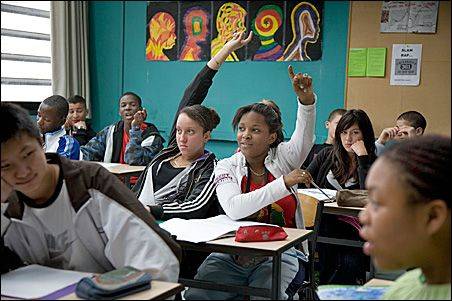
Having taught middle school children for nearly two decades, I can safely say that those wonderful moments where you find Hollywood movie teachers saving a troubled student through grit and determination are few and far between. While Michelle Pfeiffer is able to reform a “dangerous mind” or Edward James Olmos can convince his students to “stand and deliver,” many of us struggle to get our borderline kids to bring a pencil and notebook to class or get them to simply sit still. Tinsel Town knows how to put a fine inspirational shine on classroom conflicts, but they have no interest in making a teacher’s day to day struggles the focus of a multi-million-dollar movie.
With The Class, director Laurent Cantet has decided to take on what Hollywood won’t. His film, winner of the Palme D’or at this year’s Cannes Film Festival, takes an unvarnished look at one school year in a French class run by Francois Marin (Francois Begaudeau), an idealistic teacher who does his best to reach the unreachable. He faces many of the same challenges teachers here deal with, as he has to contend with class sizes that are far too large to be manageable and students who are reluctant to learn. That they are all at the same grade level but at widely varying levels of ability only adds to Marin’s frustration.
What makes The Class unique is that it offers no easy answers to the universal problems facing this educator. He is as dedicated as any teacher we’ve seen on the big screen, yet his passion and determination does not guarantee success. Many of his students are difficult and reluctant to grasp the opportunities he offers, and while he does his best to relate to them with a radically open class room in which free conversation is the norm, many opt to take advantage of him rather than learn. This leads to no end of frustration on Marin’s part, and though fueled by the best of intentions, his anger bubbles over, harsh words are said, various conversations escalate into silly confrontations, and alienation results rather than unity. Marin’s great sin is that he allows students to glimpse his humanity, and rather than seeing this as a gift in which they too could express their own vulnerabilities, they pounce on it like sharks to blood. They are a cruel, immature bunch, and that Marin allows himself to get sucked into their game shows that he too needs to mature as a teacher. Knowing which battles to fight is a crucial skill in dealing with teenagers, and it is obvious that — though driven by good intentions — this teacher needs to put his pride aside before he can truly reach those he desperately wants to help.
Shot in a documentary style and employing many long takes, Cantet is able to recreate a genuine classroom feel, replete with a shifting tone in the atmosphere of the room. The director and his cast are able to create the mercurial shifts that occur when a well-planned lesson suddenly jumps the tracks after a student goes off on a tangent and the classmates gleefully join in, driving a class out of control until feelings are hurt as personal feelings are exposed and mocked. With the film’s fly-on-the-wall perspective, the viewer is able to experience this nearly first-hand, which powerfully puts us in Marin’s shoes. There are few things more uncontrollable than a group of teens bent on upsetting any routine, and this film captures that with a degree of power and intimacy that is all too rare.
Based on Begaudeau’s own experiences as a teacher, The Class is a brave film that questions the basic tenets of the traditional education system. Its final scene is far from the uplifting triumph we are usually given in movies of this sort. More an indictment of than a tribute to educators, Cantet forcefully puts forth the notion that we are perhaps doing more harm than good in sticking to a system that not only tries to shape these young people into pegs that fit neatly into society’s round hole, but fails to meet their most basic needs as human beings.
The Class is currently playing at Boardman’s Art Theatre.








